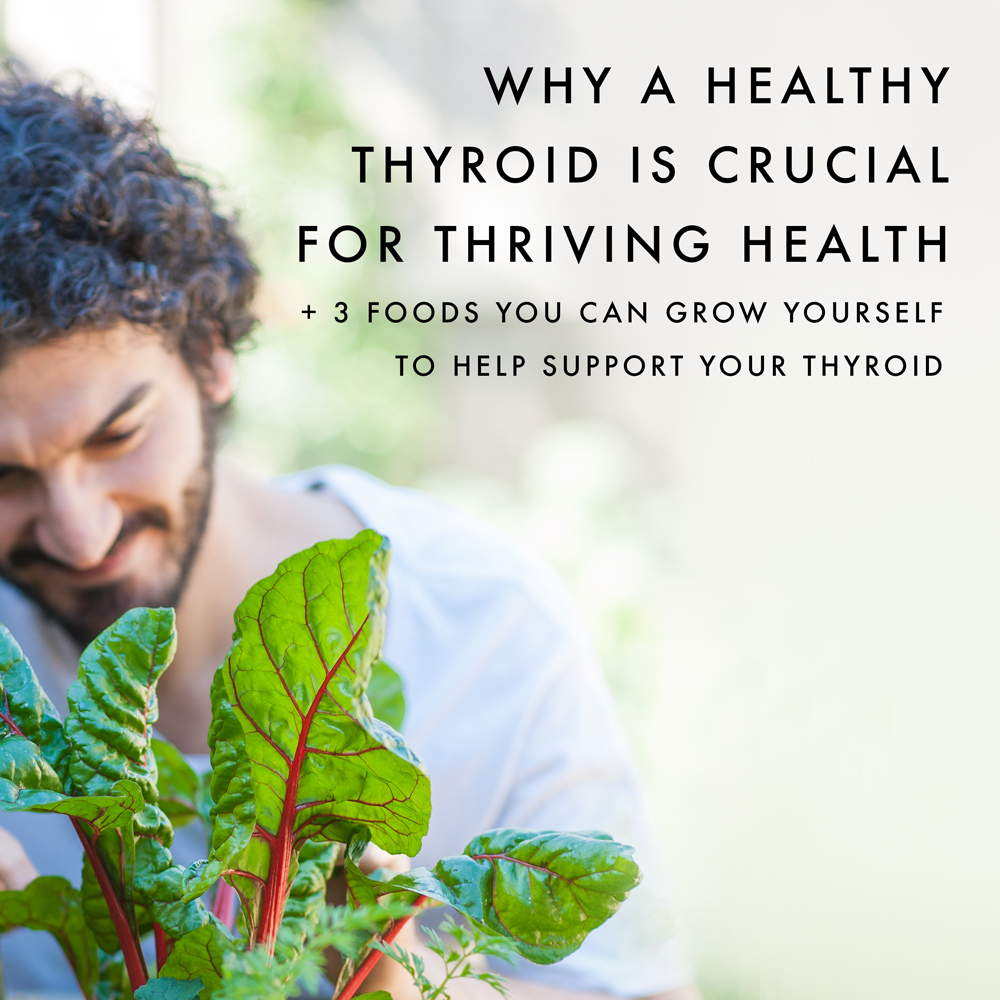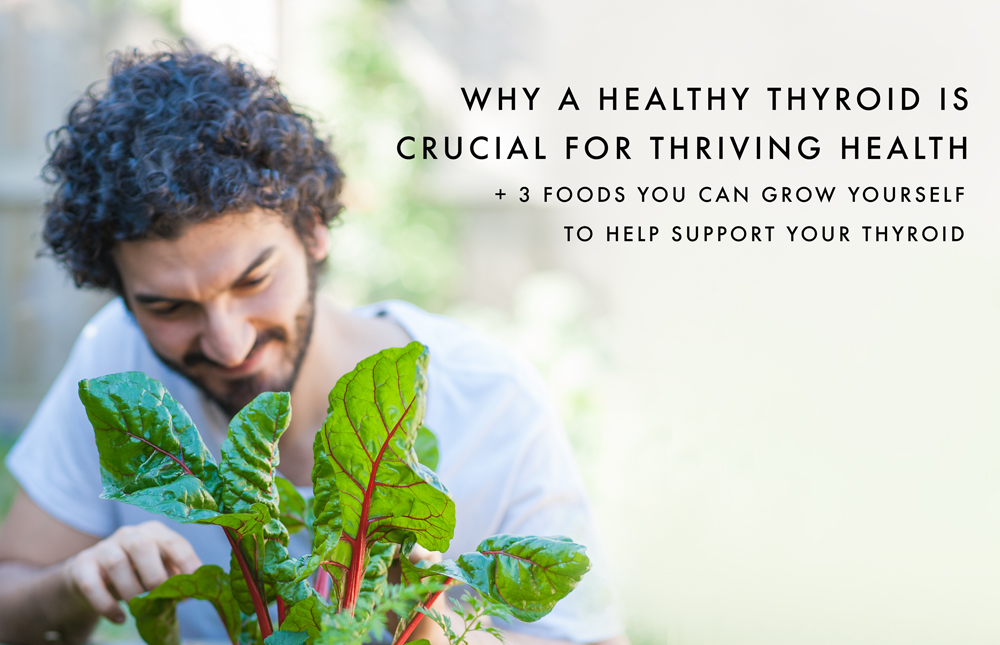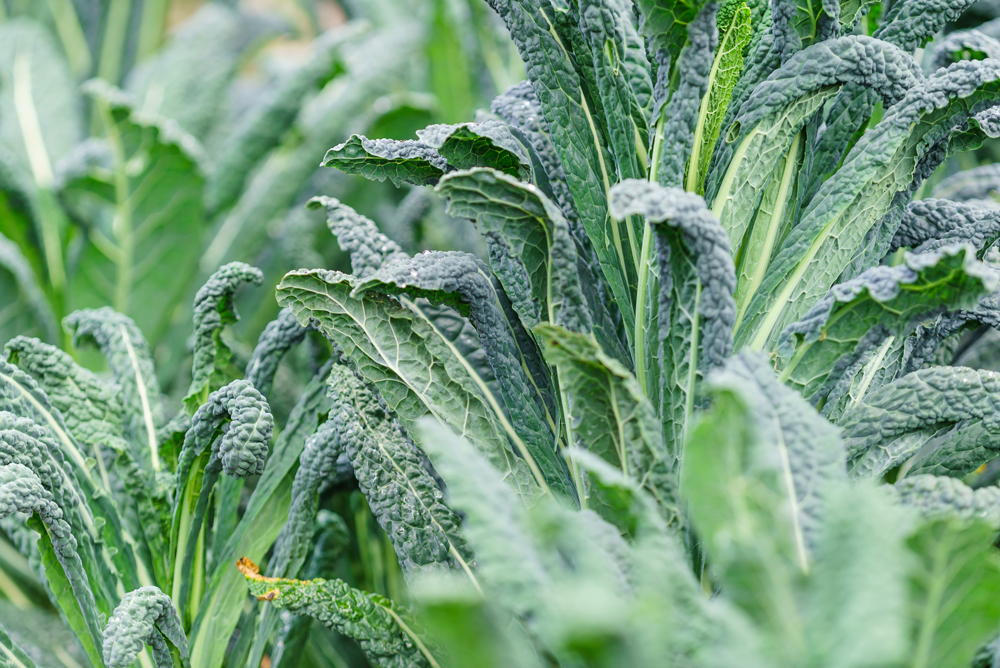
Why a healthy thyroid is crucial for thriving health + 3 Foods you can grow yourself to help support your thyroid

You may not be super familiar with your thyroid, but let me tell you – it’s hands down one of the most important organs in your entire body! And if having healthy weight, flawless skin, strong hair & plenty of energy sounds good to you, then keeping your thyroid healthy & happy should be on your list of priorities!
In this post, we’re going to look at:
- The function of the thyroid gland & why it’s CRUCIAL for good health
- Symptoms of thyroid dysfunction (there’s a lot!)
- The nutrients you need for a healthy thyroid
- The best foods to get them from, including the ones you can grow yourself
Alright let’s get to it!
The thyroid is a small butterfly shaped gland that sits at the front of your throat, but don’t let the size fool you, this little gland is a serious powerhouse!
Your weight, skin & hair, mood, metabolism, body temperature, ability to get to sleep at night, the energy to get out of bed in the morning & even the function of your other organs – just to name a few – all rely on the hormones produced by your thyroid.
Yep – it’s a pretty big deal!
Almost every cell in your body carries a thyroid hormone receptor, so if things are out of whack – even slightly – it’s a problem for your entire system. In fact, thyroid dysfunction often goes hand in hand with leaky gut & in many cases, autoimmune diseases (a condition where your immune system is confused into attacking your own body)
It’s a bit like a domino effect, one issues leads to another, & another, & another.
Thyroid dysfunction is becoming more & more of an issue & it’s estimated that about 200 million people – that we know of – around the world suffer from it!
That’s crazy isn’t it?
2 of the most common forms of thyroid dysfunction are:
Hypothyroidism – you aren’t producing enough thyroid hormone & your thyroid is underactive.
Hyperthyroidism – you’re producing too much thyroid hormone & your thyroid is overactive.
Don’t ask me why they had to go with Hypo & Hyper – they sound identical & mean the opposite!
To help you remember, think Hypo = Low, Hyper = Over.
Alright, now let’s take a quick look at some of the symptoms associated with each.
Hypothyroidism (remember that’s under active)
- Trouble losing weight, even a small amount
- Weight gain
- Irregular periods, low sex drive
- Infertility
- Goiter/nodule/growth or lump at the base of your neck
- Lack of energy, fatigue even after getting plenty of sleep
- Cold hands & feet, feeling cold in general
- Constipation
- Dry skin
- Weak nails
- Hair loss
- Brain fog, being unable to concentrate
Hyperthyroid (over active)
- Anxiety & raised heart rate
- Fatigue or lack of energy
- Being constantly hungry, even if you’re eating more than ever
- Sweating or hot flushes
- Trouble getting to sleep/insomnia
- Hand tremors
- Muscle weakness
- Weakened bones
- Diarrhoea
Not exactly a barrel of laughs, is it?
Now it’s absolutely worth noting here that you’ve probably experienced one of these symptoms at some point, & if you have, it doesn’t necessarily mean that you have thyroid dysfunction so don’t panic – but if you are experiencing a lot of these issues at once & you do suspect that you might have a thyroid issue, please make an appointment with a functional medicine practitioner asap. EVEN if you have already had your thyroid tested by a GP in the past – this is because many (not all) GP’s generally only test for Thyroid Stimulating Hormone (TSH), but this isn’t enough to tell you the whole story, you also need your Free T4, Free T3, Reverse T3 & thyroid antibodies (Thyroid Peroxidase/TPOAb & Thyroglobulin Antibodies/TgAb) to really see what you’re dealing with.
Now… While the type of symptoms, issues & causes can vary from person to person, the nutrients required for a healthy thyroid are the same for all of us. Even if you don’t have a dysfunctional thyroid, you should still be doing everything you can to support this precious little gland.
Here are the nutrients that play a HUGE role in keeping your thyroid healthy:
- Iodine
- Selenium
- Zinc
- Iron
- Tyrosine
- Omega 3 fatty acids
- Vitamin D3
- B Vitamins
- Vitamin A
The 3 foods that I always make sure are overflowing in our gardens to support my thyroid the best that I can – which you too, can easily grow yourself – are:
1. Spinach – Spinach is a great source of zinc, selenium & also contains iron
2. Beetroots – Beetroot contains B vitamins & the leaves also contain Iron
3. Kale – Kale is a great source of antioxidants & also contains B vitamins & Iron – Now there is some controversy around whether or not cruciferous veggies are bad for thyroid health. See, cruciferous veggies contain goitrogens, which are compounds that can stop the absorption of iodine, leading to a deficiency. Iodine is a key nutrient in thyroid health. However the issue is with raw cruciferous, cooking them pretty much removes their goitrogenic effects – & you’re only at risk if you have an existing thyroid issue or iodine/selenium deficiency – if this is you, just remember to cook your kale first 🙂

The other foods/drinks that are incredibly important to support thyroid function are:
- organic grass fed beef, liver & chicken
- organic leafy greens & fibrous veggies (make sure you cook those cruciferous ones if you need to)
- Bone broth from organic, grass fed bones – we have a cup every day!
- Probiotic rich foods like coconut yoghurt, kimchi, sauerkraut & fermented veggies
- Organic, wild caught fish
- Organic, cold pressed coconut oil
- FILTERED water – a heap of it!
- A high-quality supplement or multi vitamin to address any deficiencies
There are also some things that you should remove from your diet, as these foods will not only hurt your thyroid, but your overall health.
What to remove from your diet:
- Gluten
- Dairy
- Sugar
- Processed foods of any kind
- Industrial seed oils
- Trans/hydrogenated/interesterified fats
And just a quick note… as I mentioned before, if you do have a thyroid issue, or iodine/selenium deficiency, make sure you cook your cruciferous veggies first 🙂
While we’re at it, you can also try the following:
- Manage your stress (easier said than done, I know)
- Remove toxins from your environment – think mould, dust, that kind of thing
- Address any underlining infections that you might have.
Like I said, if you want healthy weight, flawless skin, strong hair, plenty of energy & more – keeping your thyroid healthy & happy is super important!
Sadly, most conventional doctors don’t believe that diet & lifestyle can have any kind of real impact on your thyroid, & would rather surgically remove it entirely, then ask questions later. So, if you think you might have a thyroid issue, try seeing a functional medical practitioner, they take a holistic approach to looking at the body & they usually have the know-how to get you where you want to go.
You can also check out the work of Dr Amy Myers, a functional MD from the US. She’s helped thousands of thyroid patients over the years & even released an incredible book on the topic called The Thyroid Connection last year – a fantastic & important read!
Thanks so much for sticking with me through this post, I hope you got something from it, & if you know of anyone else who might benefit from it, please share it with them.
And if you have any q’s at all, don’t hesitate to reach out!
Speak soon
Anth xo








Leave a Comment